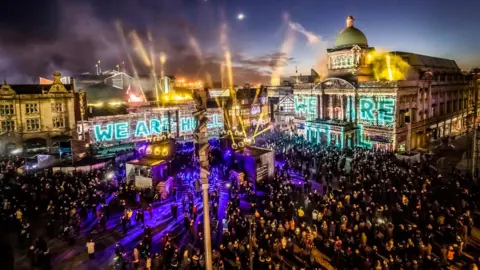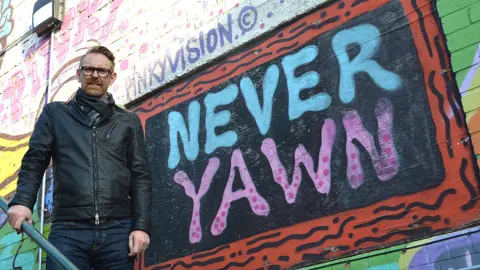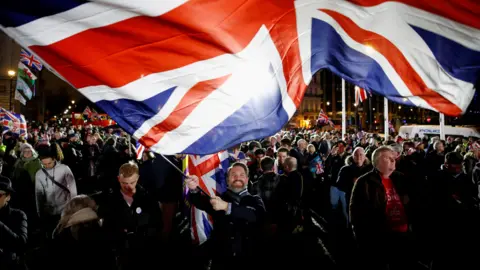'Festival of Brexit' can play 'powerful role' in healing UK, organiser says
 PA Media
PA MediaThe organisers of a £120m national festival to be staged in 2022 have put out a call for creative minds to come up with "daring, new and popular" ideas to bring the UK together after Brexit.
The event, dubbed the Festival of Brexit when it was announced by then-prime minister Theresa May in 2018, now has the working title Festival UK 2022.
Chief creative officer Martin Green is looking for "big ideas" that can help heal the divisions surrounding the UK's departure from the EU, and showcase British creativity to the world.
He will pick 10 - physical or virtual, happening anywhere and anyhow - to form the festival. They could be staged by people in the worlds of science, technology, engineering, the arts, maths, or a combination.
"This project was conceived to happen after our exit from the EU and acknowledges that we have been going through, and are going through, a divisive time," Mr Green tells BBC News.
"Creativity has always proven itself brilliant at finding more of what we have in common than what we don't. So the idea that projects can bring people together is a really timely one."
Asked whether such an event can realistically heal divisions that have come to the fore in recent years as a result of political processes, Mr Green replies: "I would say that I imagine it has a powerful role to play."

Mr Green was the head of ceremonies at the London 2012 Olympic Games and director of Hull's year as UK City of Culture in 2017. Both went down as resounding successes and were, he says, examples of the unifying power of creativity, be that for a country or a city.
He also cites the acclaimed World War One centenary events masterminded by artists like Jeremy Deller and Danny Boyle. None of those projects were overtly political. "And neither is this," Mr Green says. "Creativity, creative acts and big projects can sit to the side, above and below 'Politics with a big P.'"
He adds: "Remember, coming together and bringing people together isn't about asking people all to think and believe the same thing. It's about understanding each other and appreciating each other's differences and commonalities."
When she announced the festival two years ago, Mrs May said she wanted it to "celebrate our nation's diversity and talent, and mark this moment of national renewal with a once-in-a-generation celebration". Opponents questioned whether it was a moment that merited celebration.
Nevertheless, Mr Green believes creativity is "the best asset we have in finding ways forward and understanding the world we live in".
 Reuters
ReutersHe is reluctant to narrow down what the Festival UK 2022 might look like. Although it was inspired by the Great Exhibition in 1851 and the Festival of Britain in 1951, it will not be a single event at a single venue.
"A project might last a day or a year," Mr Green explains. "It may be one big act or 10 million tiny acts.
"Obviously we've got significant funding in place so we can be big and bold. The three key words are - we want the projects to be open, original and optimistic. And they can be live, they can be digital, but we expect them probably to be both."
Beyond that, potential participants have a blank slate. "We've said that we want the project to be a showcase of our creativity, we want projects to be big and popular, and engage millions of people, and work right across the UK."
Greater representation
The pitching process is deliberately not restricted to established names. "By doing it as an open call, we make sure that it's not just the usual suspects," Mr Green says. "We're insisting that new talent is platformed, that there's greater representation in the teams.
"So while we fully expect to be working with some of our greatest institutions and creatives, we're also making sure that it's an opportunity to surface new talent."
They don't have very long to come up with their big ideas, though. The deadline for submissions is just over five weeks away, on 16 October. After that, 30 teams will each be given £100,000 to develop their plans before the final 10 are chosen.
The call for submissions comes as the UK and EU enter the crunch period to agree a trade deal before the end of the Brexit transition period on 31 December.
In recent months, there have been calls for the festival's £120m budget to be diverted to support arts organisations that are on their knees because of the coronavirus pandemic.
Mr Green points out that the government has already pledged £1.57bn in emergency funding, and that the festival will help some such organisations.
"While there is sustainability money needed, there is bailout money needed, there's also a dignity of work issue here," he says. "All creatives want to do is make work. That's why we've made sure we get going very quickly. Within a suite of strategies to support creative industries, this is one part."

Follow us on Facebook, or on Twitter @BBCNewsEnts. If you have a story suggestion email [email protected]
